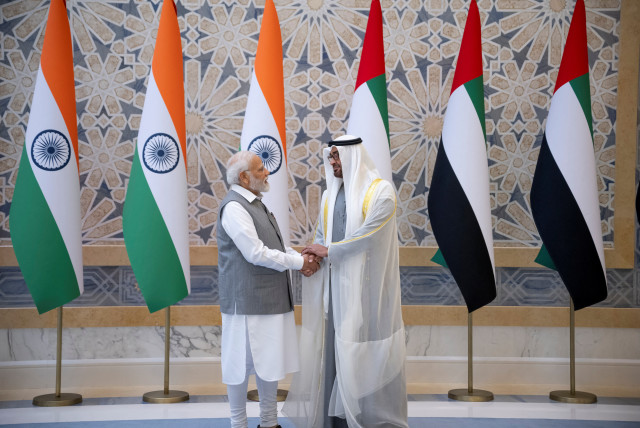India and UAE Introduce Ambitious Trans-Continental Trade Corridor Amid Regional Challenges.
In a significant development, India and the United Arab Emirates (UAE) have signed a groundbreaking agreement to establish a historic trans-continental trade corridor, intending to link Europe to India via the Middle East through sea and rail routes. Prime Minister Narendra Modi announced the pact during his visit to the Gulf state, with support from the United States and the European Union. The framework agreement, revealed by the Indian foreign ministry, represents a pivotal milestone in enhancing regional connectivity between the two nations.
While specific details of the agreement were not disclosed, the ministry highlighted that the corridor would build upon existing collaboration, bolstering the partnership between India and the UAE.
Initially introduced during the G20 summit in New Delhi last September, the ambitious corridor is envisioned to stretch from India through the Arabian Sea to the UAE, traversing Saudi Arabia, Jordan, and Israel before reaching Europe.
However, the official statement from the Indian ministry did not explicitly mention other countries besides India and the UAE.
The agreement assumes significance amid the ongoing conflict in Gaza, which has disrupted plans for further integration between Israel and its Arab neighbors.
Saudi Arabia has suspended normalization efforts amidst regional instability.
During Modi’s visit, he discussed with UAE President Sheikh Mohamed bin Zayed al Nahyan.
Despite the challenging regional circumstances, Sheikh Mohamed expressed optimism, affirming, “Today, our region is facing tough times, but thanks to our relationship with you, we are nurturing hope and anticipating a future with India that aligns with our aspirations.”
Despite regional challenges, the UAE has maintained diplomatic ties with Israel, established in 2020 under the US-backed Abraham Accords.
The framework agreement between India and the UAE underscores a commitment to the trade corridor, potentially influencing China’s global trade infrastructure initiatives and the Belt and Road connectivity strategy.
Against the backdrop of the Yemeni Houthi movement’s attacks on shipping vessels in the Red Sea, citing protests against Israel’s actions in Gaza, the maritime trade route remains vulnerable.
In addition to signing a bilateral investment pact and exchanging cooperation agreements covering commerce, digital infrastructure, and electrical connectivity, India and the UAE have finalized the corridor deal.
Aside from addressing the Indian diaspora, Modi is set to deliver a speech at a summit in Dubai, inaugurate the first stone-built Hindu temple in the Middle East in Abu Dhabi, and embark on his ninth visit to the Gulf state since assuming office.




